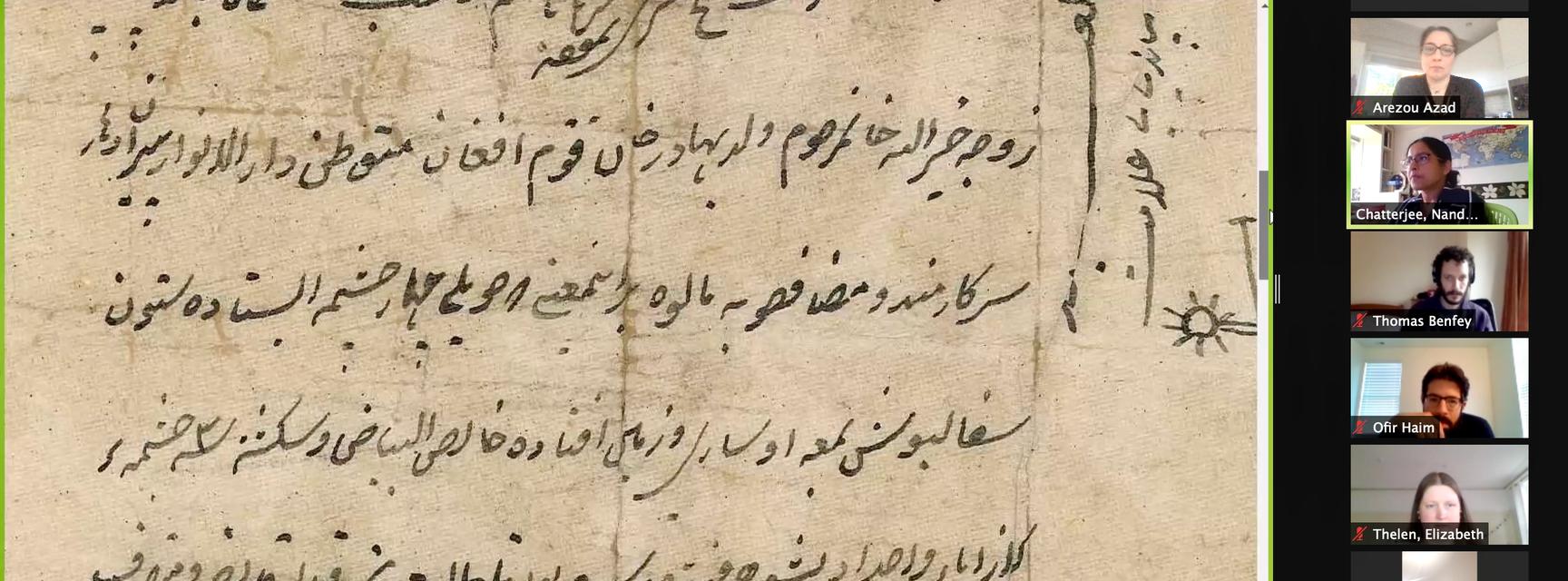Future Philology: Digitization & Beyond
Future Philology: Digitization and Beyond:
Thursday 30 September – Friday, 1 October 2021
Watch the videos of the presentations here
A Two-day Online Symposium organised by the Invisible East Programme, University of Oxford
Background
At present, philology--the old art of reading slowly and carefully--is reinventing itself to become a discipline equipped with database technology. Scholars are setting up digital corpora of documents and manuscripts of various periods and regions.
These digital corpora not only made precious historical sources much more accessible to academia, but also opened up new avenues of research on their content as well as their materiality.
The Invisible East Programme at Oxford University is contributing to this field by creating, for the first time, a multilingual digital corpus of documents from the pre-Mongol Islamicate East. This region includes Iran, Afghanistan and Central Asia, in which documents were written in, inter alia, (Judeo-)Persian, Arabic, Middle Persian, Bactrian, Sogdian, and Khotanese. We are now inviting scholars working on databases of documents from the ancient and medieval world to share their experiences and insights.
Programme summary
The online symposium will last two days and be divided into four sessions of three to four presentations each. Each presenter will deliver a 20-minute lecture followed by a 10-minute discussion. A concluding session on the second day will wrap up the symposium.
DAY ONE: Thursday, 30 September 2021
All the times in PM BST (UTC +1)
Opening Remarks
2:00 - 2:15 IE Programme Director Arezou Azad and ERC Post-Doctoral Researcher Zhan Zhang, University of Oxford
Session 1 The Back-End 1 - Assembling and interpreting manuscripts
How do we select or collate manuscripts? To what extent is computerized reading of ancient manuscripts feasible in the current state of AI tools, and how do existing specialized tools
contribute to paleographical studies? What kind of development is still needed? How do we piece together fragments from the manuscripts? What is better left to be done in “the old fashioned way”?
Chair: Columba Stewart, Hill Museum & Manuscript Library
2:15-2:45 “Beyond Neural Networks: eScriptorium as an Edition Environment“,
Daniel Stoekl Ben Ezra, École pratique des hautes études, Paris
2:45-3:15 “Tocharica digitalia” Hannes Fellner, University of Vienna
3:15-3:45 “The Audition Certificates Database” Thomas Efer, Universität
Leipzig, and Konrad Hirschler, Universität Hamburg
3:45-4:15 “Gandhari.org and READ: Digital Philology for Gāndhārī and Beyond”
Stefan Baums, LMU Munich & Stephen White, Ca'Foscari University of Venice
4:15-4:30 Session 1 wrap-up and general discussion
4:15-4:30 Session 1 wrap-up and general discussion
4:30-5:00 Coffee break
Session 2: The Back End 2 - Corpus structure, organization and search
What is the best practice of meta-data and data-tagging? What can tagging do that was inconceivable or infeasible before? In what ways is our perception of the data shaped by the metadata?
Chair: Marina Rustow, Princeton University
5:00-5:30 “Trismegistos: Connecting Texts from the Ancient World”, Mark Depauw, KU Leuven
5:30-6:00 “As simple as possible, but no simpler: basic principles for corpus organization”,
Maxim Romanov, University of Vienna
6:00-6:30 “Just about everything pre-1517: Set-up, contents, and new features of the Arabic Papyrology Database, (APD)”, Ursula Hammed, LMU Munich
6:30-7:00 “Digital Library Organization and Accessibility”, Émilie Pagé-Perron, University of Oxford
7:00-7:15 Session 2 wrap-up and general discussion
DAY TWO: Friday, 1 October 2021
Session 3: The Front End - Application and Visualization of Data
How do we apply and show data analysis results, e.g. in morphological and/or lexical studies, and visualized prosopographies?
Chair: Mark Geller, Freie Universität Berlin
2:00-2:30 “Digitization and Text Database: from the case of Old Tibetan Studies”,
Kazushi Iwao, Ryukoku University
2:30-3:00 “Visualization and Search of Zoroastrian Manuscripts: The Avestan Digital Archive and the Corpus Avesticum Berolinense”, Alberto Cantera, Freie Universität Berlin and Miguel Ángel Andrés-Toledo, University of Salamanca
3:00-3:30 “Data-Driven Modeling: Building Data Models from Ancient ‘Archives”’,
Adam Anderson, UC Berkeley
3:30-4:00 “Digital Etymology on Screen: Some Basic Principles”,
David Calabro, Hill Museum & Manuscript Library
4:00-4:30 “Analysing and editing medieval astronomical tables: metadata and front-end in DISHAS”,
Matthieu Husson, CNRS, SYRTE-Observatoire de Paris-PSL Ségolène Albouy,
CNRS, SYRTE-Observatoire de Paris-PSL
4:30-4:45 Session 3 wrap-up and general discussion
4:45-5:15 Coffee break
Session 4: The Outside World - Participation and Cooperation
New methods of enabling wider academic audiences, and non-academic audiences to participate in deciphering texts and developing databases, such as crowdsourcing, are emerging. What are the pros and cons of such public approaches? What are the lessons learned? Is this something we should encourage/develop? There is a growing number of important digital corpuses of texts in the world that are publicly available but not inter-searchable. How can we and should we interlink these?
Chair: Sarah Savant, Aga Khan University
5:15-5:45 “The Giza Project at Harvard University: Can public outreach and scholarly
access co-exist?”, Peter Der Manuelian, Harvard University
5:45-6:15 “The Princeton Geniza Project: Crowdsourcing and Interoperability”, Marina Rustow, Princeton University
6:15-6:30 Session 4 wrap-up and general discussion
6:30-6:45 Concluding remarks by IE team members


